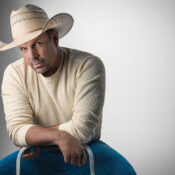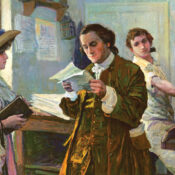Saturday Evening Post contributor Sally Beaudette sat down for an interview with Emmy-winning actor, producer, and director Henry Winkler. Best known for his work on Happy Days, Arrested Development, Parks and Recreation, and, most recently, Barry, Winkler is also a lauded children’s book author and an alleged Very Nice Guy.
Editor’s Note: This article contains both real and made-up spoilers for Barry.
Sally: What made you want to be on Barry and play Mr. Cousineau?
Henry: I was driving, got a call: “Bill Hader. HBO.” I said, “I’m in.” I mean, it was that quick. And then I had to audition twice, and that was fun, but there was a long time in between each audition. That can drive you crazy, waiting to see whether you’re in it or not.
Sally: Was it challenging — or interesting — playing a more serious character?
Henry: Well, here’s the thing. I was trained to play everybody. I was trained to play anybody. And when you have great words to start [with] and you have a great crew and great acting partners, it elevates what you’re doing. You cannot act by or for yourself, you know? There are some actors who do. There are some actors who are just worried about their performance and not the whole, but with Barry, that was not true. Everybody was an incredible team member.
Sally: That would be really important.
Henry: Sherry Thomas and her partner [Sharon Bialy] are amazing casting directors and they have impeccable taste. Every person, no matter how big or small, that we came in contact with, was great at what they do. [Producers] Alec Berg and Bill Hader promised all of us they would never repeat themselves, and they kept their word with the arc of the show, the tone of the show, the stories in the show, [while] still keeping the show.
Sally: It’s interesting, because it’s almost like Barry doesn’t change as much as it seems like he’s going to after he shoots Chris and before he kills Janice — it seems like he’s going to go in a different direction, and then he ends up still going in the direction of killing.
Henry: Well, let me tell you, I cannot say anything about that because I will ruin it. But the characters go through a metamorphosis that is jaw-dropping. I’m just telling you that, no hyperbole, you are going to be happy that you stayed with it. It’s one of the most original shows on television.
Trailer for season 4 of Barry (Uploaded to YouTube by Rotten Tomatoes TV)
Sally: It’s very… bold might not be the right word, or ambitious, but there’s so much happening.
Henry: You’re exactly right. Bold and ambitious are two good words to use for this show.
Sally: Was it challenging to keep a cohesive vibe [across the show]?
Henry: No. And I’ll tell you why. Until the last season, Bill and Alec were there all the time, keeping you on track, keeping you in their big vision. They kept it all going forward. And then in the last season, Bill did all of the episodes. And it was an astounding journey. I mean, I can’t even begin to tell you how enormous the last season is.
Sally: I was talking to my friend about it and he said, “It’s crazy, but it brings it all together.” Did it turn out the way that you wanted it to?
Henry: I had no expectation of how I wanted it to be because it was so clear that Bill and Alec had the overall vision. Now, my job as an actor is to make sure that the writer and director and creator have their vision realized. That’s our job, and in that structure comes the freedom of doing what you bring to the show.
Sally: Do you feel like the actors influenced the plot at all?
Henry: They did, because in the very beginning, I was supposed to be a total, um… a prick. A total asshole. And as I played him, they went, “Oh, yeah, we could shift him to have some warmth; to be a little bit different.” So yes, everybody had an influence, but the influence was in the structure that the two men had.
Sally: That makes sense. Good thing that was the direction the character went in because of your influence, that you made him a better person.
Henry: Well, a little bit better.
Sally: A little bit better. Do you think that Barry has a “message?” I felt like what I was getting from it was that people can’t change, and I thought that was an interesting [stance.]
Henry: I think that everybody, all the characters on the show, anybody watching it knows those people. The same way that — and I don’t mean to compare them — but the same way that Shakespeare is 500 years old, and every one of those characters: they’re your aunt, your uncle, your mother, your father, your cousin Sadie, or whatever it is. One of those people sat at your table growing up. As a writer, you write what you know; you tell the truth. And then you let your imagination take over. Once you’ve got the core of your truth — that’s how you write a story. Our job as actors is to illuminate the humanity: being alive in all of its craziness. And the message is that people can’t change. They try to change. Some of them change a little, but mostly we are who we are.
Sally: So, you don’t think people can change?
Henry: I think people can change to a point. I have changed in my personal life enormously, and I am still who I started out being. Which leads me to the question: If you could change something, what would you change about yourself?
Sally: Myself? I would stop sinning. It’s never helped me and I’ve been trying to do my own thing lately, you know, being pretty willful, and it has not been working out.
Henry: But that’s how you learn. You’re a young person.
Sally: That’s true. I have been learning. Sometimes it feels like I’m just learning every second of every day. Just constantly learning.
Henry: Welcome to being alive. And you know what? You’ll reach a plateau, you’ll stop, and then you’ll start again.
Sally: You talked about how the job of the actor is to illuminate being alive on screen. We’ve talked [before] about the worth of people, and I thought that was an interesting topic in Barry because you see the value of a life being grappled with, but then you also see people being killed just like that, in a second, for comedy. I was curious what your thoughts were about that.
Henry: Some of the [deaths] are not comedy.
Sally: Oh, yeah. When Barry kills Chris — that kept me up at night.
Henry: Wasn’t that a jaw dropper? There are many more jaw droppers.
Sally: Do you think it’s important for entertainment to “say something?”
Henry: I do, but not all. Sometimes entertainment is just: you come home, you’re beaten to a pulp by the world, and you just need to watch whatever it is that gives you a moment to decompress. For some people it is Vanderpump Rules. For some people it is Hijack. For some people it is the news, the drama, the whatever. You don’t want another message. You don’t want to sit there and think, “Oh, let me contemplate this” after a long day of just being thrown around by the wind like a plastic bag.
Sally: Sometimes you just want to plateau. You don’t want to learn.
Henry: That’s right.
Sally: By the way — you were in Macbeth, right?
Henry: Yes. At Yale.
Sally: So, did that affect Macbeth being in Barry, or was Macbeth just in Barry because it was perfect [as a parallel to Barry’s story]?
Henry: Oh, I had nothing to do with that.
Sally: And who did you play in Macbeth?
Henry: I played “Young Seward.” A walk-on. I was killed by Macbeth and I had to lie motionless for 25 minutes on the stage until the show was over.
Sally: Was that super fun?
Henry: It was a pain in the ass. Literally. I had two lines, I think.
Sally: How is the writer’s strike going?
Henry: It’s heartbreaking. There’s an expression: “If it ain’t on the page, it ain’t on the stage.” The writers are the beginning and the end. If you don’t have a good writer, you don’t have anything to direct, produce, act, build a set for, make costumes for. And then the actor strike compounds it, and all of these people are out of work. There are 163,000 card-carrying members of the SAG-AFTRA [Screen Actors Guild]. One percent of them make a viable living. Everybody else depends on those jobs and residuals and whatever they can eke for their healthcare, for their mortgage, for their kids’ school… you know, just on and on and on, and all those people have no salary whatsoever. Oh, it’s heartbreaking.
Sally: That is. From the outside it’s such a different perspective — you don’t think about all the layers that are affected. It’s like, “Oh, there’s going to be another year before we get to see a new season of Stranger Things.” But there’s so much more to it.
Henry: Restaurants are going out of business, caterers are out of business. All these ancillary [services]: the prop rentals, prop builders, costume makers, costume houses — all down. They have no business. It’s not good for anybody.
Sally: Well, I have a few more questions, but I don’t think you’re going to answer them for me because they would be spoilers and you did say you were not going to spoil anything.
Henry: Well, ask them and let’s see.
Sally: So, nobody escapes consequences in Barry, and I think that’s kind of a central theme. What would you say Mr. Cousineau’s biggest consequence was?
Henry: [Mr. Cousineau] might be in prison, but this spring, we’re putting on Finian’s Rainbow, starring cell block D, and you’d be surprised how talented the prisoners are. I, of course, am directing and starring as the leprechaun. Bill Hader doesn’t know that, but that’s what I’m doing. I made that up. I won’t tell you what the ending is because you’re going to be shocked.
Sally: Well, I only had questions that I wanted the answers to. I’m realizing now I probably should have asked you for an elevator pitch that’s going to make people want to watch the last season of Barry. Can you give us one?
Henry: Barry is original. Surprising. Shocking. Well-written. Bill Hader directed it beautifully and I promise you it is unlike almost any other show you can watch on TV in 2023. That’s why you should watch it.
Sally: Thank you!
Henry: Thank you.
Become a Saturday Evening Post member and enjoy unlimited access. Subscribe now



